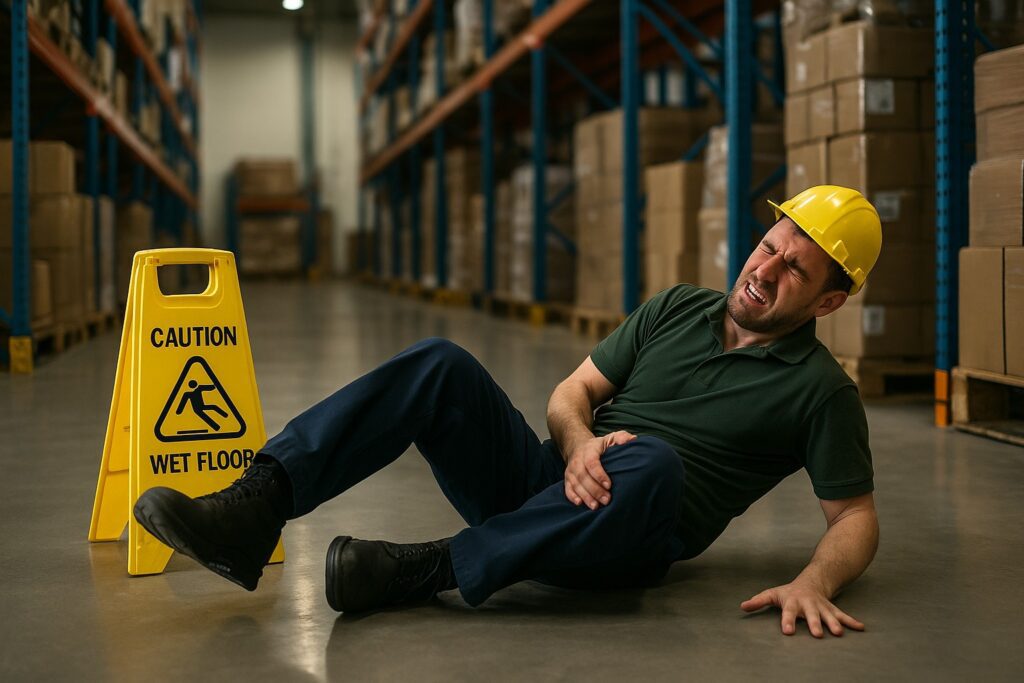
Slipping and falling at work can lead to serious injuries, missed paychecks, and considerable uncertainty. If you are wondering what happens if you slip and fall at work, the short answer is: you may have the right to medical care, wage replacement, and possibly a lawsuit, depending on your employer’s coverage and how the fall occurred. Texas does not require all employers to carry workers’ compensation insurance, so the outcome will vary.
What Happens If You Slip and Fall at Work?
When you slip and fall at work in Texas, the first step is reporting the incident immediately. Inform your supervisor or manager and request a written report. This helps document what happened and when. Immediate reporting also ensures you can access benefits quickly, especially if your employer carries workers’ compensation insurance.
If your employer does have coverage, you may qualify for:
- Payment of all reasonable medical costs;
- Partial wage replacement if you cannot work; and
- Additional benefits if the injury results in a lasting impairment.
If your employer does not carry workers’ comp, you may be able to file a personal injury lawsuit. In those cases, you will need to prove that your employer or another third party was careless or failed to provide a safe workplace.
The process may feel overwhelming, but understanding your rights will help you move forward. Keep reading to learn what causes these accidents, how claims are handled, and what you should do after a fall.
Common Causes of Workplace Falls in Texas
Falls can happen in any work environment. However, certain conditions increase the chances of slipping or losing your balance. Being aware of these hazards can help you understand what went wrong and who may be responsible.
Common causes of falls on the job include:
- Wet or slippery floors without warning signs,
- Loose electrical cords or clutter in walkways,
- Poor lighting in stairwells or workspaces,
- Damaged flooring or uneven surfaces, and
- Lack of proper safety training or equipment.
Every workplace has a duty to address these hazards or warn workers about them. If a fall happened because safety standards were ignored, you may have a valid claim.
Identifying the cause of your fall is a key step toward holding the responsible party accountable and recovering compensation.
Does Workers’ Compensation Cover a Slip and Fall?
Texas does not require private employers to carry workers’ compensation. If your employer voluntarily participates, the process is typically more straightforward. You report the injury, receive medical treatment, and may begin receiving income benefits without having to sue.
Workers’ compensation typically provides:
- Medical care for injury-related treatment;
- Temporary income benefits if you miss work;
- Impairment income for lasting damage; and
- Burial and death benefits for fatal accidents.
You cannot sue your employer if you accept workers’ comp. If your employer is a non-subscriber, they lose certain legal protections. That means you may be able to sue them directly for negligence and potentially be eligible for additional forms of damages.
Understanding whether your employer has workers’ compensation insurance is one of the most crucial steps to take after a fall.
What to Do If You Fall at Work
Taking the proper steps after a fall protects your health and legal rights. You need to move quickly and carefully to preserve evidence and claim the benefits or compensation you may be entitled to.
What to do if you fall at work:
- Report the injury to a supervisor immediately;
- Request a written incident report and keep a copy;
- Get medical attention as soon as possible;
- Take photos of the scene, your injuries, and any hazards;
- Write down the names of witnesses or coworkers nearby; and
- Contact a Texas injury attorney to review your options.
These actions can help you prove what happened and strengthen your claim. Waiting too long or skipping steps could reduce your ability to recover fair compensation.
Each of these steps plays a role in protecting both your recovery and your financial future.
Can You Sue Your Employer After a Fall?
The answer depends on whether your employer carries workers’ compensation. If they do, you usually cannot file a lawsuit. Instead, you go through the benefits system.
If your employer does not participate in workers’ compensation, you may have the right to file a personal injury lawsuit. In these cases, you will need to prove that the employer failed to keep the workplace safe.
Common examples of employer negligence include:
- Ignoring repeated reports of a hazard;
- Failing to provide proper safety gear;
- Not repairing hazardous areas, such as stairs or flooring; and
- Pushing employees to work in unsafe conditions.
If you win a lawsuit against a non-subscribing employer, you could recover full lost wages, medical expenses, pain and suffering, and more.
Knowing your employer’s insurance status helps determine your legal options after a fall.
When Should You Talk to a Lawyer?
You should speak to a lawyer as soon as possible after a workplace fall. Time limits apply, and evidence can disappear quickly. A Texas personal injury lawyer can help you understand your employer’s responsibilities, gather medical records, and build a strong case.
Legal guidance can make a difference if you are dealing with a claim denial, unclear employer status, or severe injuries. You do not need to face the process alone.
An experienced attorney can explain your rights, file the correct paperwork, and work to recover the compensation you deserve.
Talk to a Texas Injury Lawyer About Your Workplace Fall
If you slipped and fell at work, you deserve clear answers and trusted support. The Kolodny Law Firm can help you understand whether workers’ compensation applies, your rights to compensation, and the steps to take next. Do not wait to get help. Contact our team today to schedule a free consultation with a Texas injury lawyer who will walk you through your options and help protect your future.

